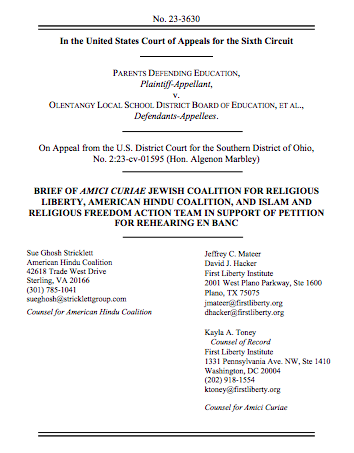Summary of facts: An Ohio school district issued a policy under which students are punished if they do not use other students’ “preferred pronouns.” A group of parents and students sued in federal district court, arguing that the policy violates the students’ First Amendment rights to freedom of speech and parents’ Fourteenth Amendment right to direct the upbringing of their children. The parents filed a motion for a preliminary injunction ordering the school district to grant an exemption to its policy for children who believe that biological sex is immutable. The court denied the motion, holding that the policy did not violate the Constitution. The plaintiffs appealed to the U.S. Court of Appeals for the Sixth Circuit. A 3-judge panel of the Sixth Circuit affirmed, reasoning that religious students have no First Amendment right to use “non-preferred pronouns” to refer to students who identify as transgender because it could hurt their feelings and “substantially disrupt” school activities. The parents are now asking the full Sixth Circuit to rehear the case.
RFI’s position: For students who belong to minority religions such as Islam, Judaism, and Hinduism that hold that sex is binary and immutable, the school district’s policy burdens their religion because it forces them to choose between obeying their conscience and affirming the government’s ideological position. The policy will also have a disproportionate impact on families of minority religions because they tend to face the most pressure to conform to the values endorsed by school officials, and they often lack alternatives to public education. The full court of appeals should rehear this case and reverse the district court decision.
Read the amicus brief here.
THE RFI BLOG

Is Egypt’s Government Trying To Take Over Christianity’s Most Important Monastery?

Does Southeast Asia Lead the World in Human Flourishing?

RFI Leads Training Session on Religious Freedom Law and Policy for U.S. Army War College

Oral Argument in Charter School Case Highlights Unconstitutional Motives Behind OK Attorney General’s Establishment Clause Claim

Largest Longitudinal Study of Human Flourishing Ever Shows Religion’s Importance
CORNERSTONE FORUM

Reaffirming Religious Freedom: Bridging U.S. Advocacy and Iraq’s Constitutional Framework

Political Polarization, Same-Sex Marriage and Religious Liberty

Bridging the Gap Between International Efforts and Local Realities: Advancing Religious Freedom in the MENA Region

Challenges to Religious Freedom in Iraq and the Critical Need for Action


